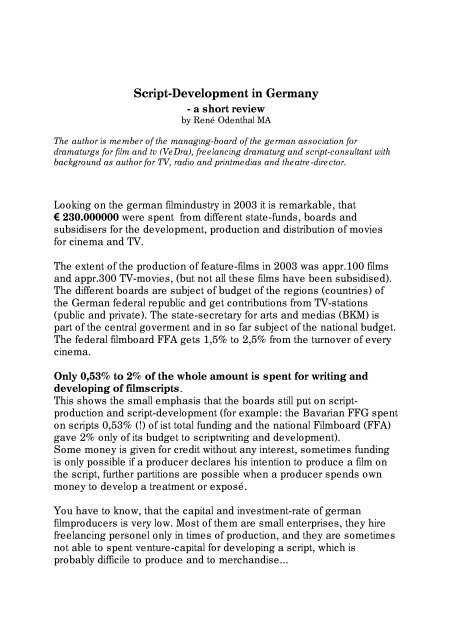Script-Development in Germany - Focal
Script-Development in Germany - Focal
Script-Development in Germany - Focal
You also want an ePaper? Increase the reach of your titles
YUMPU automatically turns print PDFs into web optimized ePapers that Google loves.
<strong>Script</strong>-<strong>Development</strong> <strong>in</strong> <strong>Germany</strong><br />
- a short review<br />
by René Odenthal MA<br />
The author is member of the manag<strong>in</strong>g-board of the german association for<br />
dramaturgs for film and tv (VeDra), freelanc<strong>in</strong>g dramaturg and script-consultant with<br />
background as author for TV, radio and pr<strong>in</strong>tmedias and theatre-director.<br />
Look<strong>in</strong>g on the german film<strong>in</strong>dustry <strong>in</strong> 2003 it is remarkable, that<br />
230.000000 were spent from different state-funds, boards and<br />
subsidisers for the development, production and distribution of movies<br />
for c<strong>in</strong>ema and TV.<br />
The extent of the production of feature-films <strong>in</strong> 2003 was appr.100 films<br />
and appr.300 TV-movies, (but not all these films have been subsidised).<br />
The different boards are subject of budget of the regions (countries) of<br />
the German federal republic and get contributions from TV-stations<br />
(public and private). The state-secretary for arts and medias (BKM) is<br />
part of the central goverment and <strong>in</strong> so far subject of the national budget.<br />
The federal filmboard FFA gets 1,5% to 2,5% from the turnover of every<br />
c<strong>in</strong>ema.<br />
Only 0,53% to 2% of the whole amount is spent for writ<strong>in</strong>g and<br />
develop<strong>in</strong>g of filmscripts.<br />
This shows the small emphasis that the boards still put on scriptproduction<br />
and script-development (for example: the Bavarian FFG spent<br />
on scripts 0,53% (!) of ist total fund<strong>in</strong>g and the national Filmboard (FFA)<br />
gave 2% only of its budget to scriptwrit<strong>in</strong>g and development).<br />
Some money is given for credit without any <strong>in</strong>terest, sometimes fund<strong>in</strong>g<br />
is only possible if a producer declares his <strong>in</strong>tention to produce a film on<br />
the script, further partitions are possible when a producer spends own<br />
money to develop a treatment or exposé.<br />
You have to know, that the capital and <strong>in</strong>vestment-rate of german<br />
filmproducers is very low. Most of them are small enterprises, they hire<br />
freelanc<strong>in</strong>g personel only <strong>in</strong> times of production, and they are sometimes<br />
not able to spent venture-capital for develop<strong>in</strong>g a script, which is<br />
probably difficile to produce and to merchandise...
That was the money-talk, let’s look at the content<br />
Aga<strong>in</strong>st all obstacles some german films get good remarks and better<br />
reviews <strong>in</strong> the current time, even <strong>in</strong>ternationally. That is dued among<br />
others to long last<strong>in</strong>g efforts <strong>in</strong> tra<strong>in</strong><strong>in</strong>g and develop<strong>in</strong>g producers,<br />
directors, screenwriters and last but not least dramaturgs and scriptconsultants.<br />
Nevertheless the share of german films <strong>in</strong> the national filmmarket is<br />
allmost lower than 15%!<br />
2<br />
In <strong>Germany</strong> the professional development of scripts is not yet usual<br />
• Authors are often hired for only small money to sketch an Exposé,<br />
allthough they <strong>in</strong>vest their creativity on this level for the most<br />
• For too long they work on treatments, because a first draft cannot<br />
be f<strong>in</strong>anced before a comission is made by TV-stations<br />
• Expirienced authors tend not to write for c<strong>in</strong>ema, because more<br />
extensive labour is necessary but not paid equivalently<br />
• Editors or producers, engaged <strong>in</strong> lots of other duties, even tra<strong>in</strong>ees<br />
have to discuss with the authors often with a lack of effective skills<br />
and expiriences.<br />
• External dramaturges are hardly contracted to overview the whole<br />
development of a project. At least they are asked when a blockade<br />
occurs or when fac<strong>in</strong>g serious problems and the shoot<strong>in</strong>g is<br />
allready sceduled<br />
These are some facts of the actual situation, that base on an exploration<br />
of our association of german dramaturgs for film and television(VeDra).<br />
Deeper <strong>in</strong>sight is provided by a study of Kunstsalon Köln, 2002 1<br />
Sheer irony an though not citable: In the USA they develop 100 scripts to<br />
shoot<strong>in</strong>g-drafts and than choose 10 for production. In <strong>Germany</strong> they ask<br />
for 100 pitches, contract 10 for an exposé, get subsidies for 5, shoot 1 at<br />
least.<br />
But there are even some good models:<br />
S<strong>in</strong>ce last year the state-secretary of arts and medias (BKM) formed a<br />
drama-department, for the tutor<strong>in</strong>g of all authors. The fund<strong>in</strong>g <strong>in</strong>cludes<br />
the fee for dramaturgical cooperation as the usual way of development.<br />
Qualified dramaturgs steer the challeng<strong>in</strong>g attempt.<br />
1 Arne Birkenstock: Autoren- und Drehbuchförderung <strong>in</strong> Deutschland, e<strong>in</strong>e Studie des<br />
KunstSalons Köln im Auftrag der Staatskanzlei NRW, Köln 2002,
3<br />
In May 2004, the MFG (the filmboard of Baden-Würtemberg) enroled<br />
new rules for the fund<strong>in</strong>g of film-scripts. The regulations <strong>in</strong>clude a<br />
specification of the authors’s skills and experiences, a remarcable<br />
<strong>in</strong>crease of the amount of money and advices for the cooperation with<br />
dramaturgs.<br />
This hopefully shows a small but good tendency, our association (VeDra)<br />
is up to discuss similar plans with other filmboards and fund<strong>in</strong>gorganisations<br />
<strong>in</strong> <strong>Germany</strong>.<br />
Some private and state-funded organisations developed programs for<br />
the script-tutor<strong>in</strong>g. So is „step-by-step“ by master-school <strong>in</strong> Berl<strong>in</strong> for<br />
expirienced authors and producers, „talents 2004“ by nordmedia for<br />
young authors or the Schreibschule of International Film School <strong>in</strong><br />
Cologne mostly for TV-needs. Although some of recent recipients of<br />
german script-awards have been tra<strong>in</strong>ed by those programs, the results<br />
have to be evaluated. We cannot but remark, that especially young<br />
authors are not able to output a script <strong>in</strong> the sceduled time. Experienced<br />
authors do not jo<strong>in</strong> these programs normally.<br />
Nevertheless a very trustfull relation is necessary <strong>in</strong> the cooperation<br />
between author and dramaturg, and this is the same for young authors<br />
as for the more expirienced ones. The more experienced dramaturgs we<br />
have, the more producers, authors and directors can hear about<br />
successfull cooperations <strong>in</strong> the field. A fundamental tra<strong>in</strong><strong>in</strong>g existed for<br />
dramaturgs <strong>in</strong> the GDR and is sceduled today still at the film-university <strong>in</strong><br />
Potsdam, HFF Konrad Wolf. Master Scool Drehbuch offers a scriptconsultant-tra<strong>in</strong><strong>in</strong>g<br />
based on workshops and onl<strong>in</strong>e-tutor<strong>in</strong>g.<br />
A market for film-dramaturgy, script-consultants or what else it is named,<br />
is known <strong>in</strong> <strong>Germany</strong> only s<strong>in</strong>ce 10 years. But this has not yet evolved a<br />
recognition. As long as the education is up to privat organisations there<br />
is no regular evaluation of the program and its contents. Many teachers<br />
travel all around Europe and teach the methods drawn from reputated<br />
US-american professionals.<br />
Art depends on diversification for to reflect human life and fantasy!<br />
Like <strong>in</strong> the tra<strong>in</strong><strong>in</strong>g of screenwriters the time has come, to go beyond<br />
structurs and rules, formed for the „all-american-three-act-plot-driven“<br />
narrations. You have to master the rules, for to go beyond for the sake of<br />
stories, scripts, film-narrations, that have to be told <strong>in</strong> their own way,<br />
based on the aethetics of the various cultural traditions and tendencies.
For the near future follow<strong>in</strong>g demands are crucial <strong>in</strong> <strong>Germany</strong>:<br />
4<br />
• Authors should apply for fund<strong>in</strong>g without any producer if a<br />
dramaturgical cooperation is proven. This is useful up to a later<br />
draft, when the <strong>in</strong>volvement of a producer is necessary.<br />
• <strong>Script</strong>-funders should cooperate across the regions. Authors,<br />
developers, producers and directors act nationwide. Any regional<br />
preferations have to be refused.<br />
• International cooperations for script-development on real projects<br />
should be <strong>in</strong>cluded <strong>in</strong> european fund<strong>in</strong>g programs.<br />
• Initiatives for the common tra<strong>in</strong><strong>in</strong>g and formation of authors,<br />
producers and dramaturges should be enroled on various scales.<br />
Before conclusion I want to emphasize, that development <strong>in</strong> film is not<br />
only <strong>in</strong> question for the filmmakers, but for the public also. When we<br />
demand to consider the audience from the beg<strong>in</strong>n<strong>in</strong>g of the development<br />
of a filmproject, we have to admit, that there are very different filmgoers.<br />
Statistics <strong>in</strong> <strong>Germany</strong> tell, that there is big chance to reach people over<br />
40 years of age, because they are bored at the TVscreen.<br />
For to get better attention and bigger sales at the ticket-counters we<br />
have to develop the audience too. Initiatives <strong>in</strong> France, Brita<strong>in</strong> and<br />
Sweden should be taken for good example and as a model.<br />
Understand<strong>in</strong>g films, regard<strong>in</strong>g mov<strong>in</strong>g pictures is a social skill, which<br />
has to be taught generally <strong>in</strong> all schools as a basic qualification <strong>in</strong> our<br />
picture-orientated era. This competence must be tra<strong>in</strong>ed for the sake of<br />
good films and its particular consumers, but grow<strong>in</strong>g aga<strong>in</strong> filmartist too.<br />
We have to face that most of the US-films are made for a public between<br />
14 and 29 years of age. This part of the population is very mobile and<br />
fast affected by the commercials. They can br<strong>in</strong>g back the <strong>in</strong>vestment <strong>in</strong><br />
the first 2 or 4 weekends after the first screen<strong>in</strong>g. When this is the aim of<br />
a production, you have to tell a simple-narrated story, with a hero with<br />
whome the youngsters can identify, more action-driven than characterorientated<br />
and after some obstacles a happy-end<strong>in</strong>g love story <strong>in</strong>cluded<br />
(or you construct a sheer action-movie).<br />
But this is not the overall issue for all films, wether <strong>in</strong> Europe nor <strong>in</strong> the<br />
USA, nor <strong>in</strong> other parts of the world. Many great movies earned their<br />
money <strong>in</strong> the long runn<strong>in</strong>g, and they are part of a vivant culture. A more<br />
fastidious audience needs more film-narrative skills, more reflectious<br />
content, more demand<strong>in</strong>g figures, more dramaturgical f<strong>in</strong>esse etc. And<br />
that can be developed!<br />
© RO 2004 (please apologise my faulty english)












